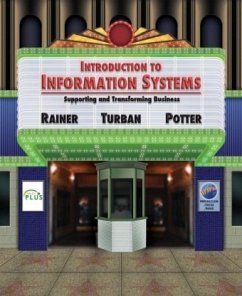Nicht lieferbar

Introduction to Information Systems
Versandkostenfrei!
Nicht lieferbar
This streamlined, easy-to-read book provides readers with the basics of information technology (IT). It is based on the fundamental premise that the major role of IT is to support employees, regardless of their functional area or level in the organization. The authors take a hands-on approach with the help of a case study that actually shows how to apply the material in an organization. They also present strong coverage of e-commerce and wireless technologies, an excellent variety of examples, and a website with additional real-world applications and cases."Introduction to Information Systems"...
This streamlined, easy-to-read book provides readers with the basics of information technology (IT). It is based on the fundamental premise that the major role of IT is to support employees, regardless of their functional area or level in the organization. The authors take a hands-on approach with the help of a case study that actually shows how to apply the material in an organization. They also present strong coverage of e-commerce and wireless technologies, an excellent variety of examples, and a website with additional real-world applications and cases."Introduction to Information Systems" ist eine knappe und gut strukturierte Einführung in die Kernthemen der IT. Das Buch zeigt am Beispiel verschiedener Unternehmensbereiche (z.B. Rechnungs-/Finanzabteilung/Personalabteilung), wie wichtig die IT für jeden einzelnen Funktionsbereich in jedem Unternehmen ist. Die Lerneinheiten wurden bewusst klein gehalten, damit der Stoff verständlich bleibt und der Leser nicht überfordert wird. Mit einer Vielzahl von Beispielen aus ganz unterschiedlichen Disziplinen, Branchen und Unternehmen. Der Band demonstriert anschaulich, wie durch die IT der Import/Export, das Management multinationaler Konzerne und das elektronische Handeln weltweit möglich wird.



